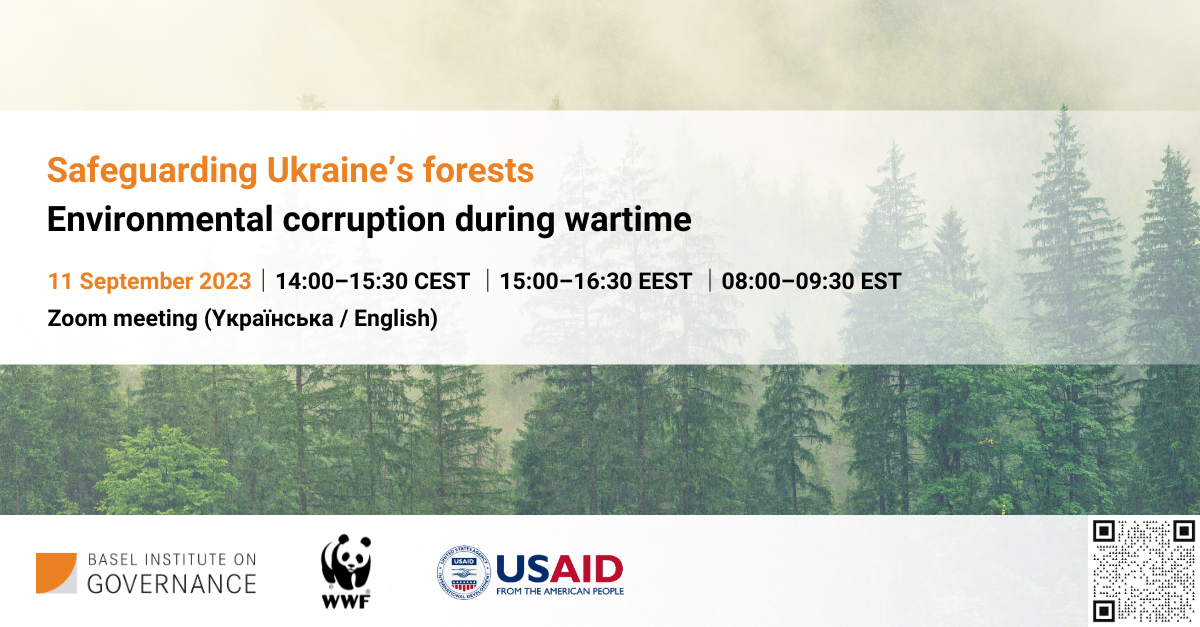Online event: Safeguarding Ukraine’s forests – environmental corruption during wartime

On 11 September 2023, the Basel Institute on Governance in partnership with WWF-Ukraine will host an online event on safeguarding Ukraine’s forests and the challenges of countering environmental corruption during wartime. All are welcome to attend the online meeting, which will have English-Ukrainian simultaneous interpretation.
On the agenda:
- Governance weaknesses in the forestry sector
- Challenges of maintaining integrity during wartime
- Corruption risks in timber and wood product sales
- Tools to increase integrity
- The role of civil society
- Synergies with transparency and accountability mechanisms in Ukraine's emerging restoration system
The 1.5-hour event will feature key speakers from Ukraine’s Ministry of Environment and Forests of Ukraine as well as forest specialists at WWF-Ukraine. These will highlight concrete actions they are taking to prevent corruption in the forestry sector and discuss how these could be made more effective.
Juhani Grossmann, who leads the Basel Institute’s Green Corruption programme and is Senior Advisor for Central and Eastern Europe, will moderate. The event is supported by the USAID-funded Targeting Natural Resource Corruption (TNRC) project.
The issue
Ukrainian forests cover over 10 million hectares – about the size of Iceland, or 2.5 times the size of Switzerland – mainly in the western and northern parts of Ukraine. Their preservation is key for the rich ecosystems and climate benefits that Ukrainian forests represent and the communities that depend on them.
Economically, the full-scale Russian attack on Ukraine in 2022 has drastically heightened the relative value of the previously under-utilised role that forests play in the national economy.
This is because Ukraine’s main industrial areas are located in occupied and fought-over territories and a large share have thus become dysfunctional. Forests, thankfully, are largely located in the “safe” areas of Ukraine and thus remain a largely intact resource.
Continued attacks on civilian infrastructure are creating high demand for forest products to generate heat and be used in reconstruction efforts. The Ukrainian Government has recognised the sector’s increased importance by restructuring the previously existing system of state-owned forest enterprises into a new one, Forests of Ukraine.
However, corruption still fails to appear at the core of the discussions in the governance of the forestry sector.
The Basel Institute’s Green Corruption team recently highlighted key challenges and opportunities in a report exploring pre-war governance and corruption issues affecting Ukraine’s forest sector. The report, part of a wider Environmental Corruption Deep Dive series, proposed a new typology of corruption and illegal logging in Ukraine and explored several real case studies.
The discussion will build on the report’s findings and previous discussions (see below). The participants will seek tangible ways for all stakeholders to strengthen governance in the forestry sector despite the exceptionally challenging conditions – to ensure that when Ukraine is victorious in the war, its biodiversity and natural resources remain intact.
Register
- Date: 11 September 2023
- Time: 15:00–16:30 EEST (Kyiv); 14:00–15:30 CEST (Basel); 08:00–09:30 EST (New York)
- Register now
Learn more
- Download the Deep Dive report: How corruption threatens the forests of Ukraine: Typology and case studies on corruption and illegal logging. / Як корупція загрожує лісам України: Типологія та аналіз кейсів корупції і незаконних рубок.
- View takeaways and the recording of the report’s launch event, featuring key members of Ukraine’s government and civil society.
- View takeaways from a hybrid conference on environmental corruption in the context of Ukraine’s reconstruction, jointly organised by the Basel Institute, WWF Central and Eastern Europe and Member of the European Parliament Viola von Cramon-Taubadel.
- Download the WWF & BCG Report: A Sustainable Economic Recovery for People and Nature / Стале Економічне Відновлення Для Людей І Природи.
About Targeting Natural Resource Corruption
The Targeting Natural Resource Corruption (TNRC) project is working to improve biodiversity outcomes by helping practitioners to address the threats posed by corruption to wildlife, fisheries and forests. TNRC harnesses existing knowledge, generates new evidence, and supports innovative policy and practice for more effective anti-corruption programming. Learn more at tnrcproject.org.
Disclaimer
This event is made possible by the generous support of the American people through the United States Agency for International Development (USAID). The contents are the responsibility of the author(s) and do not necessarily reflect the views of USAID, the United States Government, or individual TNRC consortium members.



